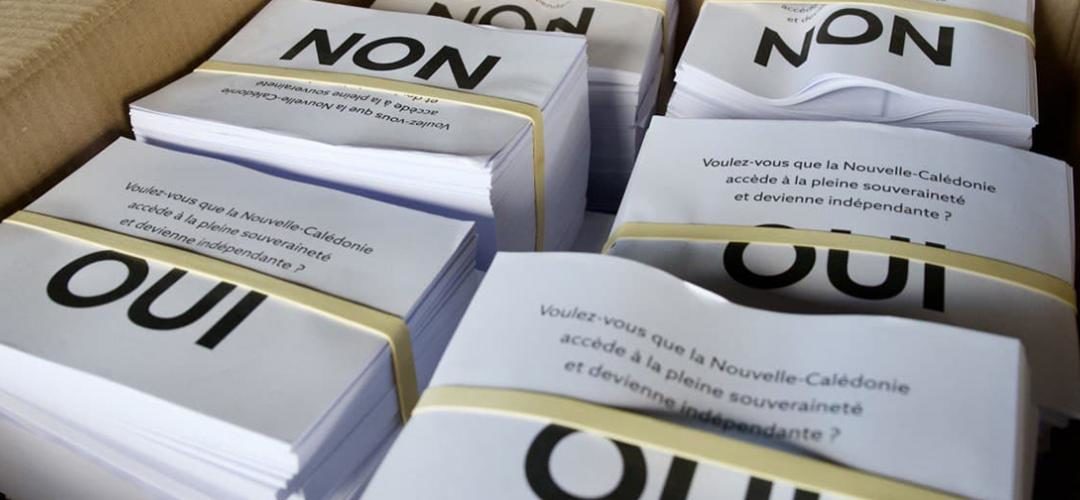“Do you want New Caledonia to accede to full sovereignty and become independent?”
The Nouméa Accord (1998) provided for the organization of a third vote in the event of two successive victories of the “no” vote, which occurred in 2018 and 2020.
The voters of New Caledonia were called to vote a third time on the accession to full sovereignty of the archipelago. The last referendum on the independence of New Caledonia was held on December 12, 2021, on the scheduled date, despite the request for postponement made by the independence party.
According to the final results of the third referendum published on December 13, 2021 by the High Commission of the Republic in New Caledonia, the “yes” obtained 3.50% of the votes cast (with 2,747 voters) and the “no” 96.50% (with 75,720 voters). The participation was 43.87% with 80,881 voters.
On October 20, 2021, the Front de libération nationale kanak et socialiste (FLNKS) had requested the postponement of the vote to September 2022 for health and social reasons related to Covid-19. The High Commissioner of the Republic having confirmed the initial date, the pro-independence movement called to boycott the referendum.
Sébastien Lecornu, French Minister of Overseas territories declared that: “if non-participation is a right in a democracy, it will have no legal impact”.
The period after the last referendum under the Nouméa Accord is merely a transition, the terms of which were not determined by the 1998 signatories, leaving the choice to future generations. Last May, in Paris, New Caledonian representatives and the French minister of overseas territories agreed on a referendum in June 2023 to define the status of the territory.
New Caledonia, which became an overseas territory (TOM) in 1946, went through a period of conflict between independentists and loyalists wishing to remain within the French Republic. Signed on June 26, 1988, the Matignon-Oudinot agreements put an end to the troubles and violence between the communities. The agreements set forth a ten-year period of economic, social, cultural and institutional development before a referendum on self-determination was held in 1998.
Ten years later, a new agreement was signed between the State, the independentists and the loyalists (Nouméa Accord of May 5, 1998. In addition to the revaluation of Kanak culture (customary status, languages, etc.) and the creation of new institutions, the text provided for a process of gradual and irreversible transfer of powers to New Caledonia before the referendum on self-determination process started.
The Nouméa Accord required a revision of the French Constitution. Article 77 of the Constitution set out the terms of implementation of the Nouméa Accord, in particular the conditions under which the people of New Caledonia were able to vote on accession to full sovereignty. The agreement was also validated by a local referendum.
The current organic law will remain in force, as the constitution of the country but, within the next two years, local representatives have to agree on the terms of a new status, with the French state approval, and submit it to the vote of the people.
Primarily, the new status will define the relationship between France and New Caledonia.
It is obvious that the territory will retain a strong autonomy vis-à-vis the metropolis. France has already bequeathed all its powers but the military, justice, police and currency.
For all other matters, negotiations will take place between the state, parliament and all local political parties. The whole thing will be submitted once again to a referendum by June 2023.
New Caledonia is also supposed to give up some of the derogations it has had until now, such as the exclusion from the electoral rolls of the 35,000 citizens who have moved to the island after 1998. This exclusion, which is incompatible with the French constitution, cannot be maintained. However, the inclusion of such a large number of new voters is likely to transform the political landscape. As such, oppositions over that matter will be fierce.
Ultimately, if the local representatives stay on the path of political pragmatism, which includes a great deal of open-mindedness (in a country with such varied cultural lifestyles and philosophies), the next status will most certainly look like that of an associated state, which is common in the south-pacific.
Simply put on Wikipedia, an associated state is the minor partner in a formal, free relationship between a political territory with a degree of statehood and a (usually larger) nation, for which no other specific term, such as protectorate, is adopted.
However, the future name and flag of the country, among other symbolic but nonetheless important elements, are yet to be chosen.


Recents comments